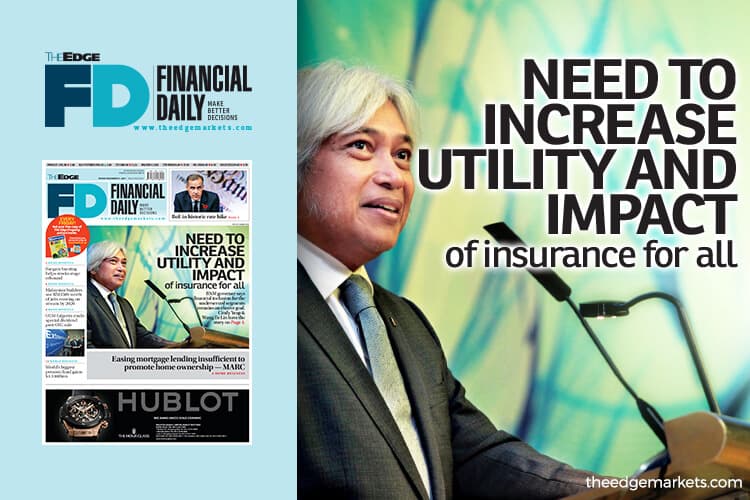
This article first appeared in The Edge Financial Daily on November 3, 2017
KUALA LUMPUR: Insurance is “a great invention” and there is need for a “renewed commitment and focus on increasing [its] utility and impact”, especially for the underserved segments of society that are confounded by rising costs and new challenges, said Bank Negara Malaysia (BNM) governor.
“In many parts of the world, healthcare costs continue to rise, and many face uncertain futures as public sector safety nets and government finances come under increasing strain,” Tan Sri Muhammad Ibrahim said in his keynote address at the 24th International Association of Insurance Supervisors (IAIS) annual conference yesterday.
According to him, insurance ought to be developed to fill financing gaps as well as “the advancement of broader goals, from the provision of healthcare, to building resilience against natural disasters, supporting trade, enhancing social security and providing opportunities for people to improve their livelihood”.
“The concept of pooling funds to assist the unfortunate and those faced with adverse situations is a very noble idea,” the governor said, noting how insurers have effectively used data to turn unknowns into knowns, and perils and hazards into opportunities long before “big data” became vogue.
The renewed focus and commitment from the insurers and the regulators supervising the industry are important as the world “continues to face immense economic, environmental and social challenges”.
“The effects of climate change are real, leaving horrific damage and destruction. Economic losses in the aftermath of this year’s hurricane season in the Gulf of Mexico are estimated to reach up to US$265 billion (RM1.12 trillion). Events that we once thought to be implausible or highly unlikely have become the ‘new normal’, ” said Muhammad, who also called on the industry to rethink its role in addressing the challenges facing the economies and society. Regulators too need to reconsider the manner in which regulation and supervision can adapt to support broader economic and social development.
In addressing these issues, new paradigms are needed to anchor business and public policy to the realities of the future in an increasingly interconnected world.
“Network effects will become more important, both in increasing the value of insurance products and services, and to better manage risks. Rather than see the competitive landscape though a zero-sum lens, cooperative competition or “coopetition” can result in synergistic benefits,” Muhammad said, relating how Hewlett-Packard’s “bold decision” allowing other producers ride on its Europe-China direct cargo links (rather than keeping it as a competitive advantage) had resulted in higher frequency which works to its advantage.
He invited the audience to “imagine the possibilities that could be achieved with strategic investments in shared infrastructure and the ability to share data securely across individuals and entities”.
“We could significantly reduce costs, improve access, deliver superior customer experience which was previously not possible, with the network of shared information, better management and improved resilience against risks,” Muhammad said.
“How we cope with the new realities will depend on our ability to reset our minds and leverage on networks to create value; at the customer, the firm, and at the system levels,” he noted.
While the global insurance industry is now on stronger and more stable foundation compared with during the global financial crisis, the governor said insurance companies can still ‘create systemic risks’ and “achieving stability objectives will become more challenging as the complexities of risk identification increase”.
In a world ‘characterised by fierce competition, complex product offering and evolving customers’ needs”, Muhammad said it is important for regulation and supervision to be “agile, pragmatic and dynamic” to respond to changing conditions in a timely manner. “The importance of proportionate regulation and supervision cannot be overstated.”
For Muhammad, the insurance industry’s stability should not be viewed in isolation but rather “seen within the wider context of preserving social and economic value of insurance systems” — more so, in light of technological advances that bring about both opportunities in expanding insurance reach, efficiency and effectiveness, as well as potential threats from non-traditional players.
In relating how platform-based solutions and insure-tech companies are opening up insurance access to large segments of the population at a fraction of previous costs, Muhammad also noted how insurers “may be confronted with fundamental ethical issues”.
“For insurance companies, this requires a rethinking of professional and ethical standards. Thus, a need for a new paradigm on ethics,” he said.
“For example, with greater ability to aggregate and analyse more data from multiple sources, questions arise on the extent insurers should consider using genetic and social preferences in underwriting. Or whether it is acceptable to commit someone to a long-term financial undertaking when they may not fully comprehend the implications of their choices even though insurers might truly believe it is ‘good’ for them. And then, there is always the dilemma and trade-offs in directing more resources towards social impact investments, in cases where it lowers risk-adjusted returns for policyholders,” Muhammad said.
As such, time and effort must be made to raise the standards and competence and developing well-defined codes of behaviour, taking into account the insurer’s legal and professional obligations, the wider impact on society, issues of equity and fairness, and preservation of virtues such as honesty and compassion.
The issues, he added, are “delicate issues that can involve complex ethical choices” and “will test the values of corporations, its people and its leadership”.
Yet businesses that make the right choices are likely to be rewarded, with the investing community putting more weight on environmental, social and governance considerations when evaluating businesses.
“Consumer welfare and wider social impacts alongside profits will constitute key metrics by which performance is measured. This is only appropriate, as maintaining [the] public’s trust and confidence is [a] good business strategy,” he said.